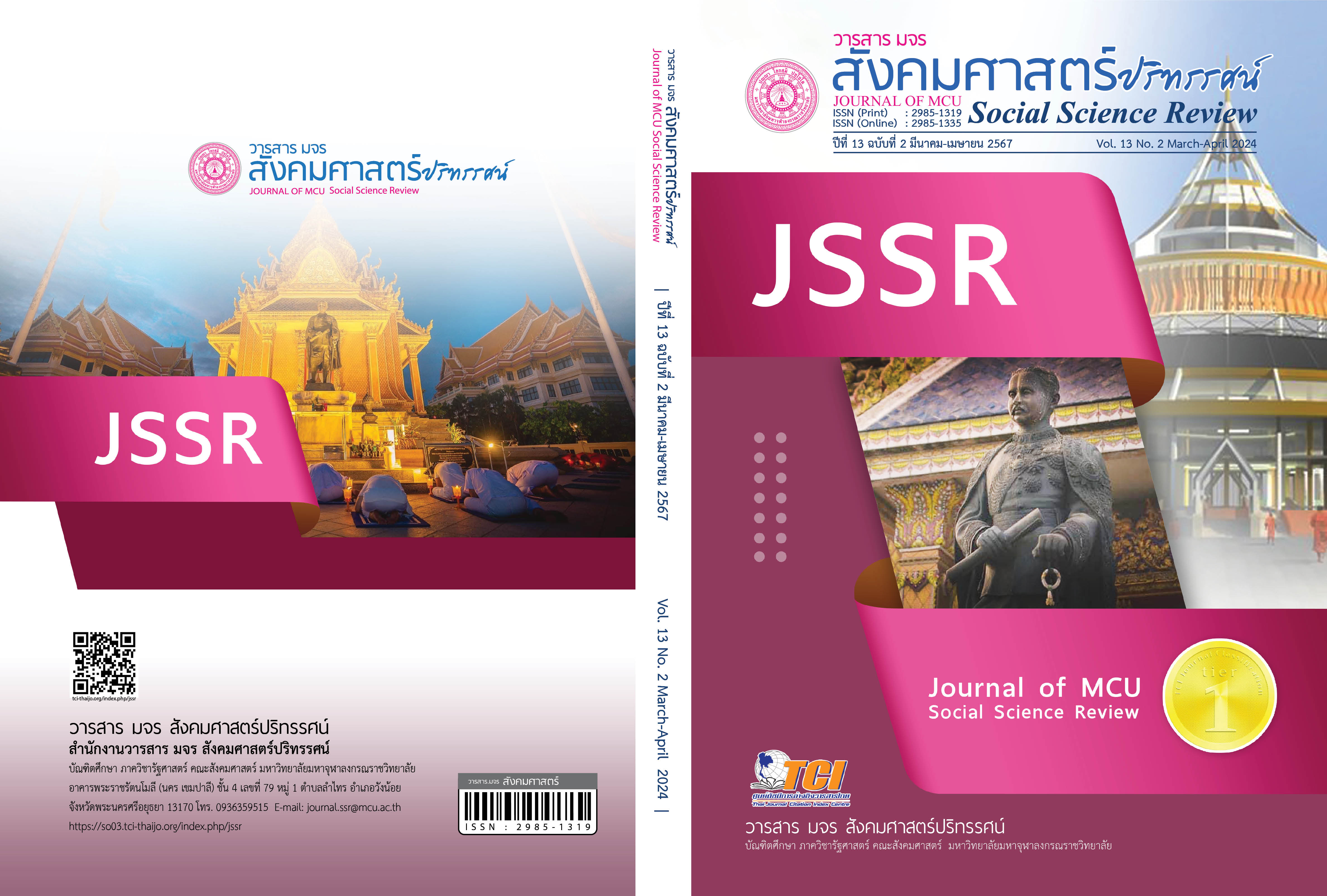ประชาธิปไตยกับสิทธิเสรีภาพในการแสดงความคิดเห็นของบุคคลสาธารณะ
คำสำคัญ:
ประชาธิปไตย, สิทธิเสรีภาพ, การแสดงความคิดเห็นบทคัดย่อ
เสรีภาพในการแสดงความคิดเห็นเป็นเสรีภาพขั้นพื้นฐานของมนุษย์ตามหลักการของระบอบประชาธิปไตย ประชาชนทุกคนต้องได้รับการคุ้มครองสิทธิเสรีภาพดังกล่าวหากกระทำการอยู่ภายใต้กฎหมาย บทความวิชาการนี้ได้ทำการศึกษาปัญหาการแสดงความคิดเห็นของบุคคลสาธารณะที่เกิดขึ้นในประเทศไทย สิทธิเสรีภาพในการแสดงความคิดเห็น รวมถึงทิศทางในอนาคตและการแก้ปัญหา จากการศึกษาพบว่า บุคคลสาธารณะ ย่อมมีสิทธิเสรีภาพในการแสดงความคิดเห็นเช่นเดียวกับประชาชนทั่วไป หากแต่การแสดงความคิดเห็นและ
การร่วมกิจกรรมทางการเมืองของบุคคลสาธารณะ ได้ส่งผลกระทบต่อสังคมและตนเองเป็นวงกว้าง เช่น เสื่อมเสียชื่อเสียงและความนิยมของตนเอง เกิดการวิพากษ์วิจารณ์อย่างรุนแรงจากประชาชน ถึงขั้นดำเนินคดีทางกฎหมาย ดังนั้นจึงกำหนดทิศทางในอนาคตทั้ง 4 ด้าน
เพื่อเป็นการเปิดเสรีภาพในการแสดงความคิดเห็นและผลกระทบที่จะเกิดขึ้นกับบุคคลสาธารณะ หนึ่งคือด้านประชาชนควรเคารพความคิดเห็นซึ่งกันและกัน สองคือบุคคลสาธารณะควรมีความเป็นกลางในการสื่อสาร และให้ข้อมูลที่เป็นจริง สามคือด้านสื่อ ต้องไม่ลิดรอนสิทธิ
ในการแสดงความคิดเห็นของบุคคลสาธารณะ ไม่ทำการบิดเบียนข้อมูล สื่อต้องเป็นตัวกลาง สุดท้ายนี้อำนาจรัฐ ข้อกฎหมาย ระเบียบข้อบังคับต่างๆ รัฐต้องไม่ลิดรอนสิทธิเสรีภาพอีกทั้งยังต้องคุ้มครองสิทธิและเสรีภาพในการแสดงออกให้กับประชาชนและบุคคลสาธารณะ บังคับใช้กฎหมายอย่างเป็นธรรม
เอกสารอ้างอิง
กมลมาศ ฤทธิศักดิ์วรกุล. (2554). ปัญหาทางกฎหมายในการจำกัดสิทธิเสรีภาพในการแสดงความคิดเห็นของนักวิชาการ (วิทยานิพนธ์นิติศาสตรมหาบัณฑิต สาขาวิชากฎหมายมหาชน). ชลบุรี: มหาวิทยาลัยศรีปทุม.
กรกริช มุ่งสวัสดิ์ และญาดา กาศยปนันท์. (2561). การกำหนดความผิดเกี่ยวกับการแสดงความคิดเห็นผ่านสื่อสังคมออนไลน์ในประการที่ก่อให้เกิดความเสียหายต่อผู้อื่น. การประชุมนําเสนอผลงานวิจัยระดับบัณฑิตศึกษา ครั้งที่ 13 ปี การศึกษา 2561. ปทุมธานี: มหาวิทยาลัยรังสิต.
ดวงพร หมื่นนุช. (2557). ประชาธิปไตยกับประชาชน เอกสารการอบรม หลักสูตรหลักนิติธรรมเพื่อประชาธิปไตย. กรุงเทพฯ: สำนักงานศาลรัฐธรรมนูญ.
ปิ่นบุญญา ลำมะนา. (2560). การจำกัดเสรีภาพในการแสดงความคิดเห็นและการแสดงออกในประเทศไทย. วารสารสังคมศาสตร์, 1(2), 63-81.
พิราภรณ์ วิทูรัตน์. (2563). เป็นดาราพูดเรื่องการเมืองได้ไหม? : ว่าด้วยบุคคลสาธารณะกับอิสระทางความเห็นที่หายไป. สืบค้น 5 สิงหาคม 2564, จาก https://shorturl.asi a/uZpE2
พิสิษฐ์ วงศารัตน์ศิลป์. (2560). ความคิดเห็นของประชาชนในการปกครองระบอบประชาธิปไตยในเขตอำเภอเมืองนนทบรี จังหวัดนนทบุรี. วารสารดุษฎีบัณฑิตทางสังคมศาสตร์, (7)3, 190-202.
วนิดา แสงสารพันธ์. (2550). ขอบเขตของเสรีภาพในการแสดงความคิดเห็นภายใต้ข้อจำกัดของกฎหมาย. วารสารผู้ตรวจการแผ่นดิน, 6(2), 20-44.
ศูนย์ศึกษาประชาธิปไตย. (2559). หลักการสำคัญของการปกครองระบอบประชาธิปไตย. สืบค้น 8 สิงหาคม 2564, จาก https://shorturl.asia/lCv3n
สมิตานัน หยงสตาร์. (2020). อัด อวัช นักแสดงกับการแสดงความเห็นทางการเมืองมันควรเป็นเรื่องปกติ. สืบค้น 5 สิงหาคม 2564, จาก https://shorturl.asia/vXuKR
สำนักงานเลขาธิการสมาชิกสภาผู้แทนราษฎร. (2555). พลเมืองในระบอบประชาธิปไตย. สืบค้น 5 สิงหาคม 2564, จาก https://shorturl.asia/GkPc8
สิทธิกร ศักดิ์แสง และณฐภัทร ถิรารางค์กูล. (2557). แนวคิดและทฤษฎีในทางกฎหมายรัฐธรรมนูญว่าด้วยอำนาจอธิปไตยที่ปรากฏในรัฐธรรมนูญแห่งราชอาณาจักรไทย พ.ศ. 2550. วารสารมนุษยศาสตร์และสังคมศาสตร์, 6(1), 199-220.
ไอลดา พิศสุวรรณ. (2563). ย้อนมองโครงสร้างวงการบันเทิงไทยที่เสรีภาพดารา ไม่เคยอยู่ใน สมการ. สืบค้น 5 สิงหาคม 2564, จาก https://shorturl.asia/e5oU7
ดาวน์โหลด
เผยแพร่แล้ว
รูปแบบการอ้างอิง
ฉบับ
ประเภทบทความ
สัญญาอนุญาต
ลิขสิทธิ์ (c) 2024 วารสาร มจร สังคมศาสตร์ปริทรรศน์

อนุญาตภายใต้เงื่อนไข Creative Commons Attribution-NonCommercial-NoDerivatives 4.0 International License.
เพื่อให้เป็นไปตามกฎหมายลิขสิทธิ์ ผู้นิพนธ์ทุกท่านต้องลงลายมือชื่อในแบบฟอร์มใบมอบลิขสิทธิ์บทความให้แก่วารสารฯ พร้อมกับบทความต้นฉบับที่ได้แก้ไขครั้งสุดท้าย นอกจากนี้ ผู้นิพนธ์ทุกท่านต้องยืนยันว่าบทความต้นฉบับที่ส่งมาตีพิมพ์นั้น ได้ส่งมาตีพิมพ์เฉพาะในวารสาร มจร สังคมศาสตร์ปริทรรศน์ เพียงแห่งเดียวเท่านั้น หากมีการใช้ภาพหรือตารางหรือเนื้อหาอื่นๆ ของผู้นิพนธ์อื่นที่ปรากฏในสิ่งตีพิมพ์อื่นมาแล้ว ผู้นิพนธ์ต้องขออนุญาตเจ้าของลิขสิทธิ์ก่อน พร้อมทั้งแสดงหนังสือที่ได้รับการยินยอมต่อบรรณาธิการ ก่อนที่บทความจะได้รับการตีพิมพ์ หากไม่เป็นไปตามข้อกำหนดเบื้องต้น ทางวารสารจะถอดบทความของท่านออกโดยไม่มีข้อยกเว้นใดๆ ทั้งสิ้น





